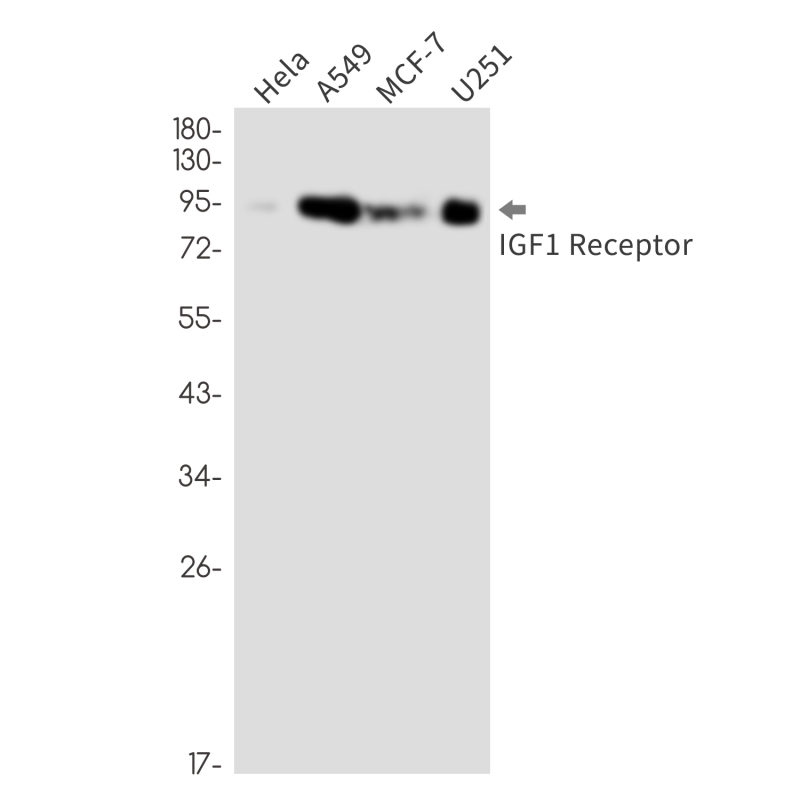
| WB | 1/500-1/1000 | Human,Mouse,Rat |
| IF | 1/20 | Human,Mouse,Rat |
| IHC | 咨询技术 | Human,Mouse,Rat |
| ICC | 技术咨询 | Human,Mouse,Rat |
| FCM | 咨询技术 | Human,Mouse,Rat |
| Elisa | 咨询技术 | Human,Mouse,Rat |
| Aliases | IGF1R; Insulin-like growth factor 1 receptor; Insulin-like growth factor I receptor; IGF-I receptor; CD antigen CD221 |
| Entrez GeneID | 3480 |
| WB Predicted band size | Calculated MW: 155 kDa; Observed MW: 95 kDa |
| Host/Isotype | Rabbit IgG |
| Antibody Type | Primary antibody |
| Storage | Store at 4°C short term. Aliquot and store at -20°C long term. Avoid freeze/thaw cycles. |
| Species Reactivity | Human |
| Immunogen | Recombinant protein of human IGF1 Receptor |
| Formulation | Purified antibody in TBS with 0.05% sodium azide,0.05%BSA and 50% glycerol. |
+ +
以下是3-4篇关于IGF1受体抗体的参考文献及其摘要概括:
1. **文献名称**: *Targeting the type 1 insulin-like growth factor receptor as a treatment for cancer*
**作者**: Sachdev D, Yee D
**摘要**: 该综述探讨了靶向IGF1R的单克隆抗体(如Figitumumab、Cixutumumab)在癌症治疗中的潜力,分析了其通过阻断配体结合或受体降解抑制肿瘤生长的机制,并总结了早期临床试验中的抗肿瘤活性和耐药性挑战。
2. **文献名称**: *Antitumor effects of IGF1 receptor inhibitor combined with chemotherapy in colorectal cancer*
**作者**: Beltran PJ, et al.
**摘要**: 研究评估了IGF1R抗体(如Dalotuzumab)与化疗药物联用对结直肠癌的效果,发现联合疗法可增强肿瘤细胞凋亡,但部分患者因PI3K/AKT通路激活产生耐药性,提示需结合分子标志物筛选获益人群。
3. **文献名称**: *Resistance to anti-IGF1R therapy in breast cancer: Mechanisms and strategies*
**作者**: King H, et al.
**摘要**: 该研究揭示了乳腺癌中IGF1R抗体治疗耐药的关键机制,包括胰岛素受体(IR)代偿性激活和下游信号通路(如MAPK)的适应性调节,提出联合靶向IGF1R/IR双特异性抗体或下游激酶抑制剂的策略。
4. **文献名称**: *Phase II trial of the IGF1R antibody ganitumab in sarcomas*
**作者**: Tap WD, et al.
**摘要**: 一项II期临床试验评估了Ganitumab(AMG479)在晚期肉瘤患者中的疗效,结果显示部分患者肿瘤生长抑制,但总体应答率有限,提示需进一步研究生物标志物指导下的精准用药。
(注:以上文献为示例,实际引用时请核实具体作者、标题及内容。)
The insulin-like growth factor 1 receptor (IGF1R) is a transmembrane tyrosine kinase receptor that plays a central role in mediating cellular growth, differentiation, and survival by binding to ligands IGF-1 and IGF-2. Dysregulation of IGF1R signaling is implicated in various pathologies, including cancer, metabolic disorders, and developmental abnormalities. IGF1R-targeting antibodies have emerged as therapeutic and research tools to modulate this pathway. These antibodies typically function by blocking ligand-receptor interactions, promoting receptor internalization, or inhibiting downstream signaling cascades.
In oncology, IGF1R antibodies (e.g., ganitumab, cixutumumab) were explored to counteract tumor proliferation and metastasis, particularly in cancers with overexpression of IGF1R or its ligands. While early clinical trials showed limited efficacy as monotherapies, combination strategies with chemotherapy or other targeted agents remain under investigation. Beyond cancer, IGF1R antibodies are studied in conditions like acromegaly and diabetic retinopathy, where IGF signaling contributes to disease progression.
Challenges include overcoming compensatory mechanisms (e.g., insulin receptor cross-activation) and optimizing selectivity to minimize metabolic side effects. Research continues to refine antibody design, including bispecific formats and antibody-drug conjugates, to enhance therapeutic potential. Overall, IGF1R antibodies represent a critical tool for dissecting IGF axis biology and developing targeted therapies for diverse diseases.
×